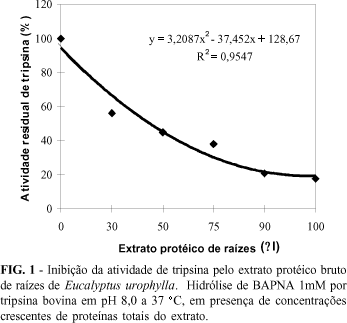Roots of eucalyptus (Eucalyptus urophylla) can be associated with fungi such as Pisolithus tinctorius, thus forming an ectomycorrhiza, or be colonized by pathogenic fungi, such as Rhizoctonia solani, agent of damping-off in nursery plants. The objective of this work was to verify the presence and activity of trypsin inhibitor, a serino-protease, in roots of E. urophylla and the activity of trypsin in filtrate of these fungi. The crude protein extract from roots and fractions partially purified by molecular sieving chromatography, using Sephacryl S-100-HR, was tested for trypsin inhibitory activity. The protein extracts or fractions, when incubated with BAPNA (a-benzoyl-arginyl-p-nitroanilide) as substrate, in presence of 0.1 M Tris-HCl buffer (pH 8,0), showed activity of trypsin inhibitor around 80%. Culture filtrates from P. tinctorius and R. solani isolates were also semi-purified by chromatography; however, no trypsin activity on BAPNA substrate was observed. Due to this, it was impossible to establish a direct correlation between the plant inhibitor and potential fungal proteases. The results presented here open new perspectives for the study of proteins in the interactions between pathogens and symbionts with eucalyptus species.


